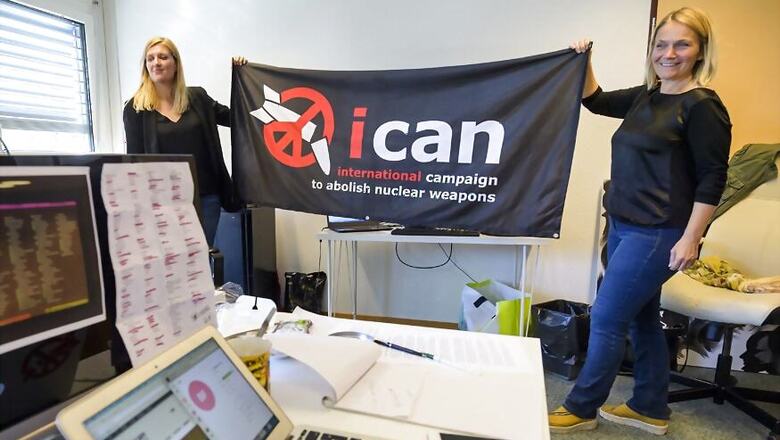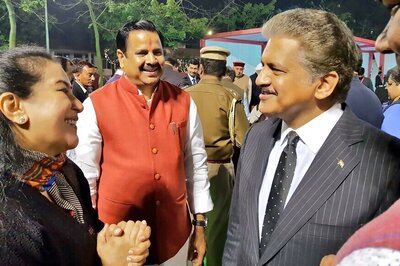
views
New Delhi: International Campaign to Abolish Nuclear Weapons, a nuclear disarmament group, has won the 2017 Nobel Peace Prize. The coalition of grassroots non-government organizations is a decade old and has been awarded the Peace Prize for its efforts towards building a global consensus against atom bomb. Their efforts culminated in the passing of the Treaty on the Prohibition of Nuclear Weapons (TPNW) in July this year.
The treaty, which “prohibits the development, testing, production, manufacture, acquisition, possession, stockpiling, transfer, use, and threatened use of nuclear weapons” will come into effect once it is ratified by 50 member states of the United Nations.
“The organization is receiving the award for its work to draw attention to the catastrophic humanitarian consequences of any use of nuclear weapons and for its ground-breaking efforts to achieve a treaty-based prohibition of such weapons,” a statement from the Nobel Prize Committee said.
The International Physicians for the Prevention of Nuclear War (IPPNW), another Nobel Peace Prize-winning organization, during a September 2006 convention in Geneva, Switzerland, decided to adopt a resolution that would finally launch ICAN. One of the motivations behind the formation of ICAN was the visible success of the International Campaign to Ban Landmines, which was instrumental in negotiating a treaty against anti-personnel land mines. On April 30, 2007, during the Treaty on Non-Proliferation of Nuclear Weapons (NPT) preparatory committee meeting, ICAN was formally introduced to the world.
Since its inception, ICAN has partnered with 468 Non-governmental organization (NGOs) in 101 countries. It has three partner-organizations each in India – Indian Doctors for Peace and Development; Indian Institute for Peace, Disarmament and Environmental Protection; and Popular Education and Action Centre – and in Pakistan – Community Motivation & Development Organization; Pakistan Doctors for Peace and Development; and Alliance for Peace and Disability Rights (APDR).
In December 2014, during the Vienna Conference on the Humanitarian Impact of Nuclear Weapons, over 600 ICAN campaigners turned up at the conference and pressured member states to push for a new legal instrument banning nuclear weapons. ICAN called for the “long overdue implementation of the NPT”. Following ICAN’s plea, Austria issued a ‘Humanitarian Pledge’ to work towards filling the “legal gap for the prohibition and elimination of nuclear weapons.”
ICAN took Austria’s pledge forward and spent nearly a year campaigning for it. By November 2015, it managed to get 127 countries around the world to sign the Humanitarian Pledge. Around the same time, the United Nations General Assembly (UNGA) set up an Open-Ended Working Group (OEWG) to look at possible ways of achieving “multilateral disarmament”. ICAN then campaigned with the OEWG, which eventually recommended to the UNGA to “authorize negotiations” for elimination of nuclear weapons. It was finally by July 2017 that the TPNW was passed by a 122-1 vote in the UNGA and ICAN’s efforts bore fruit.
The Nobel Committee statement on Friday said, “We live in a world where the risk of nuclear weapons being used is greater than it has been for a long time. Some states are modernizing their nuclear arsenals, and there is a real danger that more countries will try to procure nuclear weapons, as exemplified by North Korea.”
This award comes at a time when the world is on edge as US President Donald Trump and the North Korean dispensation are in a public spat over the latter’s nuclear weapons program. Currently, there are eight nations in the world that possess nuclear weapons. These are the United States of America, Russia, the United Kingdom, France, China, India, Pakistan and North Korea. Israel, too, is believed to possess nuclear weapons, though the middle-eastern nation has not officially declared such. India, Pakistan and North Korea are not signatories to the NPT. India had refused to be a part of it in the 1960s, claiming the NPT regime to be discriminatory. India said it created a world of “haves” and “have-nots”. In 2006, after a round of negotiations between then US President George W Bush and Prime Minister Manmohan Singh, India decided to separate its civilian and military nuclear programs.




















Comments
0 comment